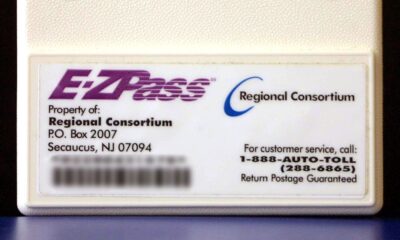Travel
Cyprus is funding desalination plants for hotels to tackle tourism’s water shortage woes
The government will provide €3 million of funding over the next two years to help hotels build their own desalination plants.
Cyprus said Wednesday it plans to subsidise the construction of private desalination plants at hotels to ensure the tourism-reliant island nation has enough fresh water to see it through busy summer seasons.
The demands of millions of visitors put a severe strain on dwindling reserves.
Water levels across the country’s 108 dams are at alarmingly low following the second-driest winter in a decade, and the national water supply network is struggling to cope due to demand and leaks.
Maria Panayiotou, the country’s agriculture and environment minister, said the government will provide €3 million of funding over the next two years to help hotels build their own desalination plants.
In addition, measures will be introduced to make it easier and faster for key sectors, such as agriculture and tourism, to build small-scale desalination plants.
Cyprus will spend a further €8 million on fixing pipe infrastructure to reduce water leaks and losses which are estimated as high as 40 per cent, according to Panayiotou.
Cyprus already has four permanent desalination plants
The government measures build on Cyprus’s growing reliance on desalinated water. Four additional mobile desalination plants are scheduled to become operational in October, producing 30,000 cubic metres of drinkable water daily.
Cyprus already has four permanent desalination plants in operation, each producing 235,000 cubic metres of fresh water daily. A fifth plant is out of action due to a fire.
Panayiotou said last December that more desalination plants are needed to increase daily fresh water production fourfold over the next decade.
Cyprus continues to rely on an extensive dam network with a total capacity of 330 million cubic metres.
Cyprus has more dams relative to its population than any other country in Europe, according to the minister. The dams are currently at 24.6 per cent of capacity, compared with 47.2 per cent in 2024, official figures show.
Tourism accounts for 13.5 per cent of Cyprus’ gross domestic product. Tourist arrivals last year exceeded 4 million, setting a new record.
Travel
‘We expect respect’: Bali cracks down on ‘naughty’ tourists with strict new rules
Bali’s mayor has warned that some transgressions could be met with legal consequences.
Bali has introduced a series of new guidelines for tourists in a bid to clamp down on inappropriate behaviour.
Authorities say the strict measures aim to safeguard the Indonesian island’s cultural integrity and sacred sites.
The rules cover clothing and behaviour when visiting temples and religious complexes, including prohibiting menstruating women from entering.
The mayor has warned that some transgressions could be met with legal consequences under Indonesian law.
New guidelines to regulate foreign tourists while in Bali
The new regulations were issued by Bali governor I Wayan Koster on 24 March.
“We issued a similar regulation before, but as things change, we need to adapt. This ensures that Bali’s tourism remains respectful, sustainable, and in harmony with our local values,” Koster said.
The guidelines focus on ensuring respectful behaviour when visiting sacred sites and enforcing the payment of Bali’s tourist levy.
They also oblige tourists to use licensed guides and accommodation, follow traffic laws and exchange currency at authorised outlets.
“I am implementing this circular as an immediate measure to regulate foreign tourists while they are in Bali,” Koster added.
New rules ban inappropriate photos and single-use plastics
The new rules require tourists to wear modest and respectful clothing and to “behave respectfully whether at religious sites, restaurants, shopping areas, or public roads”.
Visitors are banned from swearing, causing disturbances, or being rude to locals, officials, or fellow tourists. The mayor also said that “sharing hate speech or misinformation on social media is also prohibited”.
Other outlawed activities include entering sacred temple areas without permission, littering, and working without permits.
Single-use plastics, including plastic bags, styrofoam, plastic straws, and plastic-packaged drinks, are also banned.
Under the new guidelines, foreign tourists “should observe and honour Balinese customs, traditions, and cultural practices, especially during ceremonies” and “dress appropriately when visiting temples, tourist attractions, or public spaces”.
In addition, foreign visitors are not permitted to “enter sacred temple areas unless they are worshippers wearing traditional Balinese attire”. The directive adds that “menstruating women are also prohibited from entering these areas”.
Tourists are also not allowed to climb sacred trees or monuments or take inappropriate or nude photos at religious sites.
Tourists who fail to pay visitor levy face legal consequences
Last February, Bali introduced a one-time entry fee of 150,000 Indonesian rupiah (€9) for international visitors to fund conservation efforts.
As part of the new guidelines, “tourists who fail to pay the tourist levy will be denied access to attractions, and those caught violating the regulations will face legal consequences in accordance with Indonesian law”.
Recently, Balinese officials floated a daily tourist tax similar to the $100 (€95) Sustainable Development Fee that Bhutan charges most international visitors.
‘We expect our guests to show the same respect that we extend to them’
The directive comes just a few days before Nyepi – a sacred holiday known as the day of silence – on 29 March. The festival sees the island come to a standstill for 24 hours, requiring everyone, including tourists, to stay indoors.
“We have prepared a special team to conduct an operation. Foreign tourists who are naughty will be immediately dealt with firmly,” Koster was quoted as saying by local newspaper The Bali Sun.
He added that the island’s civil service police unit will be monitoring tourist behaviour and ensuring compliance with the new regulations.
“Bali is a beautiful, sacred island, and we expect our guests to show the same respect that we extend to them,” Koster said.
Travel
‘Fundamental for tourists’ trust’: Why Italy is cracking down on fake hotel and restaurant reviews
Italy’s new rules aim to tackle both mistaken and malicious reviews by requiring proof of a visit and banning incentives for positive comments.
Alessandro Gilmozzi is a famed chef and president of the Ambasciatori del Gusto (Ambassadors of Taste) association, which promotes culinary excellence in Italy.
He is also one of the leading proponents of Italy’s crackdown on fake hotel and restaurant reviews, which is pushing for stricter regulations for both consumers and businesses.
“Someone once wrote that he ate a panna cotta in my restaurant,” the owner of two-Michelin-starred El Molin told the Italian daily La Repubblica, “but I’ve never made that dessert.”
Gilmozzi discovered that the reviewer had never been to his restaurant and had simply made a mistake. “But you can also do damage, even in error,” the chef said.
Italy is tackling the problem of both mistaken and malicious reviews with new rules requiring proof of a visit and banning incentives for positive comments.
“Today marks an important step for the protection of our businesses,” Daniela Santanché, Italy’s tourism minister, told the media when introducing the legislation.
“Reviews, which thanks to this regulatory intervention will actually be truthful, are fundamental for the success of companies and for the trust of consumers and tourists.”
But how widespread is this problem across Italy, and what is already being done to tackle fake reviews?
‘Fighting fake reviews is crucial to protect customers’
False or manipulated content impacts between 6 and 30 per cent of the revenue of businesses in the hospitality and tourism sector, according to Italy’s ministry of enterprises. Many hotels contacted by Euronews Travel have had their own personal experiences of receiving reviews like this.
“Like many establishments in the industry, we too have encountered reviews that do not reflect a real experience or are clearly influenced by external factors, such as unfair competition or expectations not aligned with the service offered,” says Simona Lollini, Director of Revenues at Palazzo di Varignana, a hotel in the hills just outside Bologna.
“Sincere and authentic reviews are essential not only to ensure fairness, but also to allow our potential guests to understand our real positioning and the value of the experience we offer.”
Forte Village on the island of Sardinia says it has also received unfair and misleading reviews.
“Unfortunately, there are a growing number of cases that then prove to be fake information from guests looking to receive benefits from the hotels as a result, or by people who have never stayed at the property,” the resort says.
“Fighting fake reviews is crucial to protect consumers and provide businesses with effective tools against unfair competition.”
What are Italy’s new rules on writing hotel and restaurant reviews?
In January, the Italian government proposed a draft law to clamp down on misleading or damaging reviews about the country’s hotels, restaurants and tourist attractions.
Fake reviews are already illegal in Italy, but the country is stepping up its regulations to try and stop them from being left in the first place.
The legislation, which is still to be approved by parliament, will require anyone wanting to write a review to demonstrate proof of their visit – such as a receipt – and provide verifiable ID.
Reviews will have to be written within 15 days of a visit and should be detailed, transparent and relevant to the experience.
The draft law prohibits the practice of paid-for or incentivised reviews – such as offering customers freebies in exchange for positive appraisals – and selling content.
It also allows for the right to reply to comments, with establishments able to request their removal if deemed false or misleading.
Businesses will be able to ask for reviews that are more than two years old to be taken down as well as those that are no longer relevant (a comment about a hotel not having a lift that has now been installed, for example).
It is not yet clear how review sites such as Booking.com and Tripadvisor will account for the new rules, such as the requirement for proof of visit.
“We have long had in place a reviews system where only customers who have booked a reservation through our platform are able to leave a review, while enabling accommodation owners to respond to comments left by customers. We are monitoring the development of this law and how it applies to us,” Booking.com told Euronews Travel.
‘There seems to be a certain carelessness in leaving negative reviews’
Fines for violating the new rules will reportedly be between €5,000 and €10 million. The hefty sums reflect the frustrations of hospitality businesses, which say that, thus far, misleading comments have gone unpunished.
“There is perhaps an imbalance between the ‘right/power’ of customers to leave negative reviews and the ‘right/power’ of the company to defend itself,” says Mauro Brasioli, communication and distribution manager for AG Hotels.
“In general, there seems to be a certain carelessness in leaving negative reviews probably because there’s no risk involved; upon closer inspection, even when it’s proven that the review is false, the customer remains unpunished (except for complicated, lengthy legal cease and desist actions) but the damage to our image, albeit temporary, remains.”
Who will decide whether a review is fake or not isn’t yet clear, but the responsibility of checking content and issuing eventual fines will be given to the anti-trust watchdog Italian Competition Authority (Autorità garante della concorrenza e del mercato).
‘One step ahead of the bad actors’
Travel booking and review site, Tripadvisor, recently released its annual transparency report, which shows that fighting fake reviews is a concern across the board, not just in the Italian tourism sector.
“Tripadvisor continues to tackle fraudulent activity, including fake reviews that are designed to manipulate business listings’ ratings and rankings,” the company wrote in its report.
“Through a combination of advanced technology, human analysis, and community engagement, Tripadvisor successfully safeguarded travellers from 2.7 million fraudulent reviews in 2024.”
Around 9,000 businesses received warnings for engaging in incentivised reviews – where businesses ‘bribe’ customers or ‘reward’ employees for positive ratings – the report added.
360,000 removed reviews were linked to employee incentive programs, where businesses offer rewards to their own staff in exchange for positive feedback.
“With fraudulent review schemes evolving, Tripadvisor has strengthened its fraud detection models and reinforced policies that lead to penalising businesses on our platform, continuing to stay one step ahead of the bad actors,” the company said.
Travel
Ryanair launches ‘Prime’ subscription service for frequent travellers. Is it worth it?
While subscription services might save travellers money, they are also a way to persuade more people to fly – which is bad news for the planet.
Low-cost airline Ryanair has launched a new subscription service offering perks that it says can save travellers up to five times the sign-up fee.
The subscriber discount scheme known as ‘Prime’ costs €79 for 12 months.
Member benefits include free reserved seats, free travel insurance and access to 12 annual (one each month) member-exclusive seat sales.
“Ryanair has been delivering the lowest fares (and the best services) in Europe for the last four decades, and we’re now extending our price leadership with the launch of our exciting new subscriber discount scheme,” says Dara Brady, CMO of Ryanair.
“So, if you like flying regularly while also saving money, then Ryanair ‘Prime’ is a no-brainer.”
The Irish carrier is not the only company to offer a subscription service – Hungarian Wizz Air launched an ‘all you can fly scheme’ last year starting at €499 annually.
While these services might save travellers money, they are also a way to persuade more people to fly – which is bad news for the planet.
Ryanair’s ‘Prime’ service allows travellers to save on seat fees and travel insurance. According to the company, subscription members who fly 12 times per year will save up to €420 (more than 5 times the sign-up fee).
“Even members who only fly 3 times per year will save €105 – that’s more than the €79 cost of becoming a “Prime’ member,” the airline says.
The subscription service is limited to 250,000 members on a first come first served basis, and travellers can sign up at ryanair.com.
Are flight subscription services a step back for sustainability?
Considering flight subscription services aim to encourage more travellers to take the plane, some environmental groups see them as a step back for sustainable aviation.
Talking about Wizz Air’s scheme last year, Hannah Lawrence from the campaign group Stay Grounded described the launch in the middle of a climate crisis as “like adding wood to a burning fire”.
“It shows the industry has no intention of reducing their emissions and cannot be trusted. While Wizz Air stokes the fire just to boost their profits, it’s those who have never set foot on a plane who will bear the biggest burden from the climate-wrecking emissions these flights will produce,” she added.
Stay Grounded also called for an urgent ban on frequent flyer programmes, the introduction of a frequent flying levy, and investment in grounded transport, “in order to avoid the worst of climate breakdown”.
Earlier this year, a spokesperson from the European Environment Agency (EEA) said that while many EU member states have policies in place to decrease transport-related greenhouse gas emissions by 14.3 per cent in 2030, programmes that encourage unlimited flying could contribute to environmental degradation, overtourism, and an increased carbon footprint.
“One effective strategy for mitigating the environmental impacts of mobility is managing demand whenever possible,” the EEA spokesperson added.
“Travellers should remain mindful of their consumption and waste. Choosing eco-friendly destinations, accommodations and activities, supporting local businesses, and prioritising lower-emission transport options – such as public transport, rail, walking, and cycling – over air travel can all contribute to more sustainable tourism.”
-

 EU & the World6 days ago
EU & the World6 days agoToll Road Scam Texts: About the ‘Unpaid’ Messages & How to Spot Them
-

 EU & the World4 days ago
EU & the World4 days agoVanessa Trump: 5 Facts About Donald Trump Jr.’s Ex-Wife
-

 EU & the World6 days ago
EU & the World6 days agoGeorge Foreman’s Kids: Meet the Late Pro Boxer’s 12 Children
-

 EU & the World5 days ago
EU & the World5 days agoGeorge Foreman’s Wife: About Mary Joan Martelly & His Ex-Wives
-

 EU & the World5 days ago
EU & the World5 days ago‘Wicked Part 2’: Title, Release Date, Cast & More Details
-

 EU & the World4 days ago
EU & the World4 days agoAre Tiger Woods & Vanessa Trump Dating? Inside the Rumors
-

 EU & the World6 days ago
EU & the World6 days agoFreeda Foreman: 5 Things to Know About George Foreman’s Daughter Who Died At 42
-

 Politics4 days ago
Politics4 days agoA Step Toward Peace: Margara-Alican Border Temporarily Reopens Amid Diplomatic Hopes









